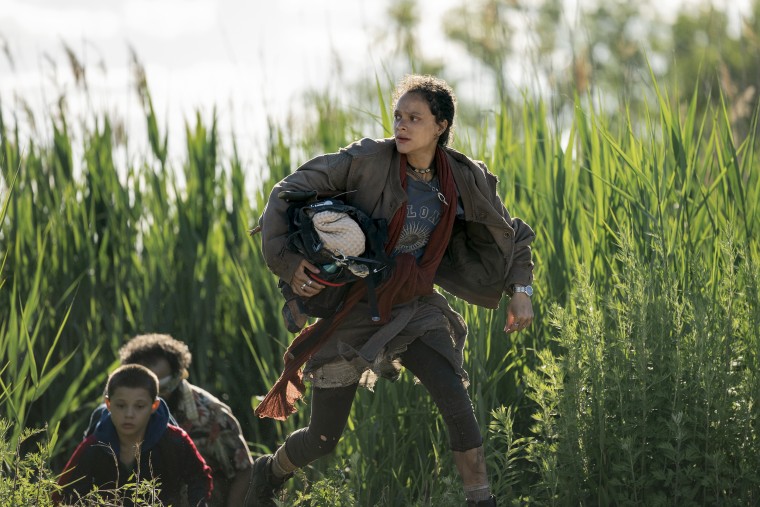In the new Amazon conspiracy/action series "Utopia," the protagonists are in a deadly race to prevent the spread of a flu-like virus. In the age of Covid-19, that plot is almost too on the nose. But oddly, the series doesn't feel especially prescient. Instead, it underlines the difference between the apocalypses of genre fiction and real catastrophes. "Utopia" is a fun, pulpy dystopia precisely because, no matter how miserable the world it depicts becomes, it's not as miserable as the world we've got.
"Utopia" is a fun, pulpy dystopia precisely because, no matter how miserable the world it depicts becomes, it's not as miserable as the world we've got.
"Utopia" was adapted by Gillian Flynn from a 2013 British original series. It focuses on a group of comic book nerds who believe the unpublished graphic novel "Utopia" contains hidden clues about future pandemic disasters. When the comic is offered for sale at a convention, the group gathers to try to purchase it, only to become targets of a murderous supersecret organization known as the Harvest, led by the shadowy Mr. Rabbit. They are saved (sort of) by meeting up with Jessica Hyde (Sasha Lane), the main character in the comic who turns out to be a real, and really deadly, person.
The series starts out with a darkly humorous tone, but it quickly turns nasty and violent. Minor characters are assassinated with gleeful abandon, as you'd expect. But "Utopia" also has a "Game of Thrones" willingness to maim and murder its leads on a whim. Jessica Hyde, who is the main emotional focus of the show, is deeply damaged and erratically violent. She murders and tortures with no compunction, and often for no reason. She even emotionally and physically abuses children. And she's the protagonist!
"Utopia," the show, then, is ironically named. The world it presents is extremely dystopic, cruel and unrelenting. And yet, in a lot of ways, the rolling apocalypse in this alternate, ugly world makes more sense, and is therefore less disturbing, than our own ongoing Armageddon.
At least through the seven of eight episodes available for reviewers, the Harvest's exact plans and goals are obscure. The organization has a complicated scheme which involves releasing a virus to kill large numbers of children at disparate locations around the country. The organization wants to leverage the response to cause greater chaos, or seize power, or both.
The government response to the disease in "Utopia" is ineffectual and inadequate. But it's notably not nearly as ineffectual and inadequate as our own government's response has been to the coronavirus. After dozens of deaths in the series, officials declare a full-blown national emergency, which includes sweeping efforts to hold corporate bad actors responsible and decisive quarantine measures. Public health messaging is led by experts.
The government response to the disease in "Utopia" is ineffectual and inadequate. But it's notably not nearly as ineffectual and inadequate as our own government's response.
In "Utopia," the president does not get on national television and recommend that people might be able to protect themselves from the virus by injecting bleach. Nor does the government downplay the dangers of the virus for months. Nor do political leaders suggest that grandparents should sacrifice their lives for the sake of the economy. For that matter, the virus in "Utopia" is a lot less deadly than the coronavirus. In the show, dozens of children die. This is obviously horrible, but pales in comparison to the over 200,000 people and counting who have died from Covid-19 in the U.S., and more than 940,000 worldwide.
Just as disheartening as the sheer scale of our real-life catastrophe is its pointlessness. The Trump administration has failed to contain the virus for lots of reasons and for no reason. Some officials appear to have argued that the virus would just hurt blue states, and so should be ignored. More broadly, Trump seems to have thought the virus would hurt his re-election chances, and so decided to hope it would just go away. There was no master plan; just laziness, partisan animosity, and weaponized incompetence.
In contrast, the deaths in "Utopia" have some purpose. Even if we don't know exactly what Harvest wants, we at least know it wants something. This is why conspiracy theories are comforting. It's scary to think that powerful, evil, hidden forces are manipulating events. And yet, if those forces are manipulating events, it means that someone, somewhere, knows what they're doing. If the comic book nerds in "Utopia" can just decipher the comic and stop Harvest, the virus can be beaten back, and people will stop dying. To solve the problem, you thump the bad guys. It's not easy, but at least it's clear.
Like a lot of genre fiction, "Utopia" revels in unpleasantness, gore and sudden violent death. But its battered, damaged, traumatized characters get to shoot evildoers, and unravel their webs of nefariousness. Disease is a tactic deployed by bad actors, and you can fight bad actors with guns and a solid kick to the face. That's why, as bloody and ugly as the world of "Utopia" is, it isn't really a dystopia. It's escapism. Watching it, you get to feel, for a little bit, that with just one more revelation, and one more twist, we can figure out how to save the world.

